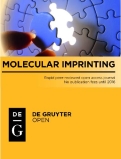|
|
Reference type: Journal
Authors: Panahi R, Vasheghani-Farahani E, Shojaosadati SA
Article Title: Separation of l-lysine from dilute aqueous solution using molecular imprinting technique.
Publication date: 2007
Journal: Biochemical Engineering Journal
Volume: 35
Issue: (3)
Page numbers: 352-356.
DOI: 10.1016/j.bej.2007.01.027
Alternative URL: http://www.sciencedirect.com/science/article/B6V5N-4MYMG22-7/2/5171dc77012f88b1070b46d725949b1d
Abstract: In the present study, separation of l-lysine from dilute aqueous solution by solid-phase extraction based on molecular imprinting technique using a polar porogen was investigated. l-Lysine imprinted polymer (LLIP) was prepared by free radical solution polymerization of methacrylic acid and ethylene glycol dimethacrylate as functional and cross-linking monomers, in the presence of l-lysine as an imprint molecule, mixture of water and methanol as solvent and AIBN as an initiator. Non-imprinted polymer (NIP) as control was also prepared by the same procedure in the absence of template molecules. LLIP particles were applied to determine the optimum operational condition for l-lysine separation from dilute aqueous solution. In adsorption step, optimum pH and retention time were 7.8 and 90 min, while corresponding values in extraction step were 12 and 50 min, respectively. l and d-Lysine recovery by LLIP at optimum condition were found to be 96 and 58% with corresponding distribution coefficients of 8000 and 460, respectively. The retention capacity of LLIP was 27.26 mg l-lys/g of polymer at optimum condition
Template and target information: lysine
Author keywords: molecular imprinting, lysine, separation, adsorption, Optimum condition, Retention capacity
|


 I love MIPs T-shirt
I love MIPs T-shirt







 Special offer joke T-shirt
Special offer joke T-shirt







 Multi MIPs logo frosty mug
Multi MIPs logo frosty mug






